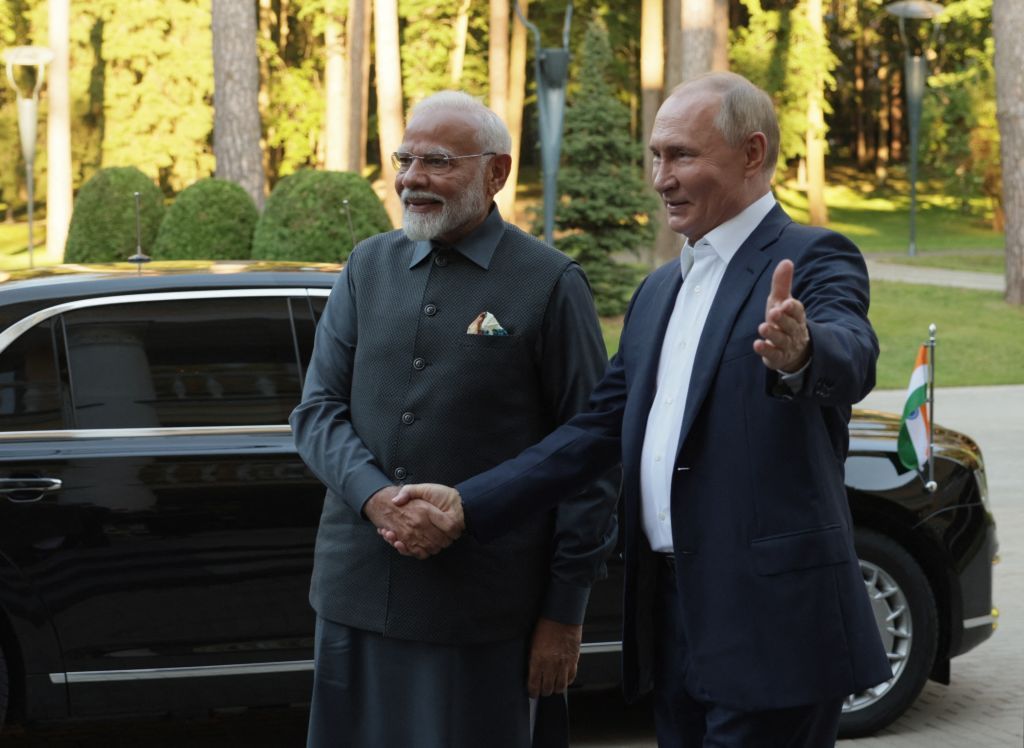Opinion: What to make of the new Russia-North Korea alliance

Russian President Vladimir Putin (R) and North Korean dictator Kim Jong Un (L) attend a welcoming ceremony amid Putin's state visit to Pyongyang, North Korea, on June 19, 2024. (Contributor/Getty Images)

Yoon Young-kwan
Former Korean foreign affairs minister
Not content with disturbing the peace in Europe, Russian President Vladimir Putin recently signed a comprehensive strategic partnership treaty with his North Korean counterpart, Kim Jong Un. As troubling to China’s leaders as it is to Western officials, the deal is shaking up the geopolitics of Northeast Asia and sending reverberations around the world.
Despite the strategic unease that Putin has provoked, the West must be careful neither to overestimate nor underestimate the treaty’s importance. The reasons for Putin’s recent trip to Pyongyang – his first visit in 24 years – were deeply pragmatic. Russia urgently needs North Korean ammunition, weapons, and laborers to continue waging its war against Ukraine; and North Korea, as isolated as ever, longs for diplomatic support, as well as energy, food, cash, and sensitive military technologies of the kind that only the Kremlin can provide.
For Kim, Russian military technologies are particularly important, because they could enable North Korean nuclear-armed intercontinental ballistic missiles to survive re-entry into Earth’s atmosphere and hit any target in the world without being intercepted by missile-defense systems. Moreover, if North Korea can produce quiet nuclear submarines with Russia’s help, they would pose a major security risk not just to South Korea and Japan, but also to the United States.
If Russia does provide such sensitive technologies to North Korea, it will upend the military balance on the Korean Peninsula and across Northeast Asia. But a major limitation might prevent Russia from doing so: the incongruity between China’s global strategy and those of Russia and North Korea.
China’s highest strategic priority is winning the global competition against the U.S. Its leaders want to replace the U.S.-led unipolar international system with a Chinese-dominated multipolar arrangement, and have tried to drive wedges between the U.S. and its allies, hoping to pull some into its own orbit. China has refrained from providing direct military assistance to Russia, despite their “no-limits” partnership, precisely because it wants to avoid driving European countries fully into America’s arms.
Similarly, China has been pursuing more amiable diplomatic relations with South Korea, including by participating in a trilateral South Korea-Japan-China summit in Seoul in May, where it voiced its commitment to the “denuclearization of the Korean Peninsula.” Then, the day before Russia and North Korea concluded their new treaty, China and South Korea held a 2+2 high-level diplomatic security dialogue in Seoul.

China has long pursued stability on the Korean Peninsula, mainly because it wants North Korea to serve as a buffer between it and the South Korean and U.S. troops stationed just south of the demilitarized zone. By contrast, Russia’s most urgent concern is winning the war it started. In his desperation, Putin has seemed willing to push all other concerns to the back burner. But since his new agreement with Kim is merely a marriage of convenience, it could begin to falter as soon as the war in Ukraine ends. And since Donald Trump has declared that he would end the war on his first day in office (presumably by giving Putin whatever he wants), that moment might not be too far off.
In the meantime, Kim will be desperate to get his hands on the highly sensitive Russian military technologies he craves. His primary goal is to establish North Korea as a de facto nuclear state that the international community will just have to accept.
Of course, if Russia does succumb to North Korean pressure and gives Kim the technologies he wants, the U.S.-Japanese-South Korean partnership will grow stronger. There would be more frequent joint military exercises, and more U.S. strategic assets allocated to the peninsula. South Korean public opinion might also shift further toward supporting a domestic nuclear weapons program or redeploying U.S. tactical nuclear weapons on South Korean territory. These developments would be counter to China’s strategic interests.
Despite appearing to be sidelined from the Russia-North Korea strategic marriage, China holds significant leverage over both smaller powers. China’s economy is about nine times larger than Russia’s and more than a thousand times the size of North Korea’s. Russia probably could not continue fighting in Ukraine if China stopped purchasing Russian energy exports or stopped providing dual-use materials (which have both civilian and military applications, exempting them from sanctions). Likewise, the North Korean economy simply cannot survive without Chinese food, energy, and trade.
Given these dynamics, the West should focus on leveraging the strategic incongruence between China, Russia, and North Korea. For the U.S., that means maintaining diplomatic engagement with China and deterrence vis-à-vis Russia. If there is confirmation that Russia has indeed provided sensitive military technologies to North Korea, the U.S., South Korea, and Japan must take highly visible steps toward strengthening their security cooperation and creating more direct linkages between East Asia and NATO.
Chinese and U.S. strategic interests overlap far more on the Korean Peninsula than they do in Ukraine or the Middle East. Both want stability in the region, which suggests that diplomacy toward that end has a real chance of success if both countries make the effort.
Editor’s Note: Copyright, Project Syndicate. This article was published by Project Syndicate on July 10, 2024, and has been republished by the Kyiv Independent with permission.The opinions expressed in the op-ed section are those of the authors and do not purport to reflect the views of the Kyiv Independent.











